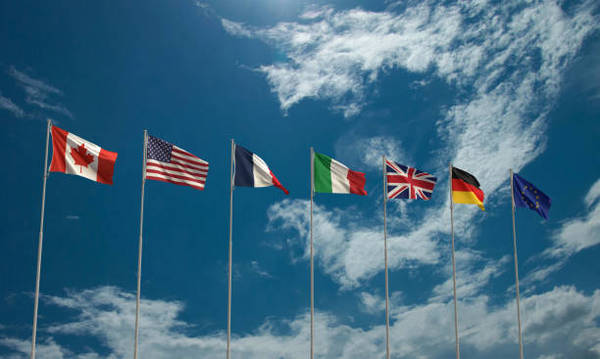G7 threatens tighter sanctions against Russia
The G7 group of nations has made a joint statement saying it will ramp up sanctions against Russia if a peace deal with Ukraine is not reached.
 IMAGE: Flags of the G7 countries. Getty Images
IMAGE: Flags of the G7 countries. Getty Images
Following yesterday's summit in Canada, finance ministers of the G7 group of countries said that it was ready to explore all options, “including options to maximize pressure such as further ramping up sanctions,” if a ceasefire agreement between Russia and Ukraine falls through.
The news has renewed pressure on Russian oil exports and provided some upward thrust to Brent crude’s price.
“European members of G7 considering tightening sanctions against Russian oil to pressure Vladimir Putin on Ukraine,” Vanda Insights’ founder and analyst Vandana Hari remarked.
The G7 includes the US, Canada, France, Germany, Italy, Japan and the UK, as well as the European Union (EU) as a non-enumerated member. The group has previously implemented price caps on Russian oil products as strategic measures aimed at reducing Russia's export revenue.
In 2022, a price cap of $60/bbl was set on crude oil originating from Russia. The following year,, two additional price caps were established on refined Russian oil products: $100/bbl for higher-value products such as diesel and gasoil, which trade at premiums to crude oil; and $45/bbl for lower-value products like fuel oil, which trade at discounts to crude oil.
Earlier this week, the EU adopted its 17th package of economic sanctions against Russia aimed at limiting oil revenues flowing to its war chest.
The EU agreed on a new package of sanctions against Moscow, targeting 189 vessels that are allegedly a part of the Russian shadow fleet used to circumvent the price caps set on Russian crude and oil products.
The latest round of sanctions has raised the total number of sanctioned shadow fleet vessels carrying Russian oil to 342, the European Commission said. It has targeted specific vessels that circumvent the G7's price caps.
“The EU is throwing around the idea of lowering the G7 price cap for Russian oil to US$50/bbl from US$60/bbl,” two analysts from ING Bank remarked.
A shadow fleet is made up of older vessels that intentionally evade regulations. By assembling a shadow fleet used to circumvent sanctions meant to restrict Russian oil revenues, the country has effectively traded outside the imposed price caps.
By Aparupa Mazumder
Please get in touch with comments or additional info to news@engine.online





